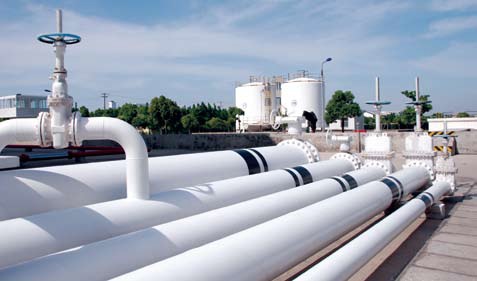 This article by Jennifer Tan (left, Director, Research & Products, Equities & Fixed Income, at the Singapore Exchange) was published in SGX's kopi-C: the Company brew series on 20 January 2017. The article is republished with permission.
This article by Jennifer Tan (left, Director, Research & Products, Equities & Fixed Income, at the Singapore Exchange) was published in SGX's kopi-C: the Company brew series on 20 January 2017. The article is republished with permission.
The Chief Operating Officer of Mainboard-listed China Aviation Oil adheres to a strict code of ethics, and can be a contrarian of sorts. A seasoned trader, Jean Teo is known to be a straight shooter. "As senior management, there's a need to stand firm and say 'No', even to the boss - I know this is uncommon in a Chinese-run firm, but it's important to do what is right," Teo said with a smile.
Teo, who has a Master of Business Administration in Finance from UK's Manchester Business School, left BP in 2010 to join Cargill International as a senior distillates trader. A year later, she returned to Asia Pacific's largest physical jet fuel trading company as its COO. |
Comeback Kid
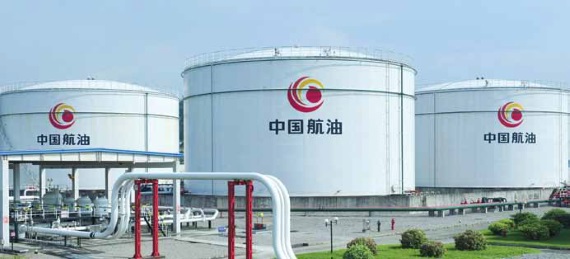 The Group owns 39% in Xinyuan, which owns the Shuidong storage tank farm in Guangdong. It also owns 26% in Oilhub Korea Yeosu, which has oil storage facilities in Korea. (Photo: Company)Listed on SGX in December 2001, CAO has a market capitalisation of about S$1.3 billion. The Group is 51%-owned by China National Aviation Fuel Group, while BP holds a 20% stake.
The Group owns 39% in Xinyuan, which owns the Shuidong storage tank farm in Guangdong. It also owns 26% in Oilhub Korea Yeosu, which has oil storage facilities in Korea. (Photo: Company)Listed on SGX in December 2001, CAO has a market capitalisation of about S$1.3 billion. The Group is 51%-owned by China National Aviation Fuel Group, while BP holds a 20% stake.
Its shares have doubled over the 2016 calendar year, generating a total return of 104.0%, outperforming the benchmark Straits Times Index's total return of 3.8%, and the FTSE ST All-Share Index's total return of 5.5%.
The management of CAO is visibly committed to enhancing shareholder value. The Group's dividend policy is centred on a growth-based payout formula, and for financial year 2015, it paid out dividends comprising 30% of total profits attributable to shareholders.
Fuelled by its relentless internationalisation strategy, CAO is very much a comeback kid, Teo said. In 2010, the Group derived 80% of its revenues from China, with the rest of the world contributing 20%. Today, that ratio is 50:50 of a growing pie.
|
We do not bet on oil prices, as we are very much a supply company. That's why we've been able to produce very consistent results over the years, despite the volatility in oil prices. - Jean Teo China Aviation Oil |
"We're no longer just a Chinese company - we're now more in tune with the world, thanks to our global focus," she added.
And how the tables have turned.
"In 2008, when CAO resumed full operations, we had to canvass for credit support from banks. Today, the stigma attached to a Chinese company has essentially been removed - we are now courted rigorously by trading partners and financial institutions alike."
The Group's diversification strategy, which started about six years ago, revolves around aviation marketing and trading activities, particularly, the trading of other oil products and the geographical expansion of its customer base.
Right now, the key priority is to establish a global distillates trading team, especially for jet fuel, as demand for the transportation fuel continues to rise, underpinned by burgeoning global aviation growth, Teo noted.
While CAO inherited its Hong Kong and US offices from its Beijing-based parent, it established its London office from scratch.
"I was responsible for setting up the UK office, which added to the Group's global footprint, and that gave me a lot of satisfaction," she noted.
"This is because I enjoy creating new things, building expertise in new areas, and growing them to the stage where they become lucrative." 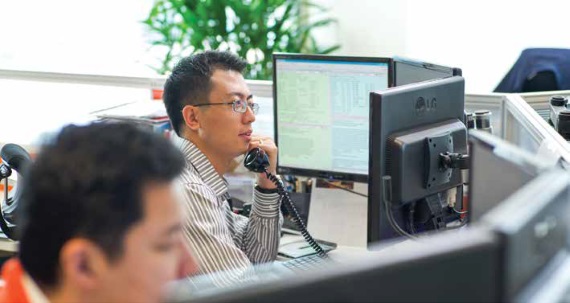 CAO trading bench (Photo: Company)
CAO trading bench (Photo: Company)
While important, trading remains an ancillary function for CAO. "We do not bet on oil prices, as we are very much a supply company," Teo said.
"That's why we've been able to produce very consistent results over the years, despite the volatility in oil prices."
| ♦ Tilting the Balance | ||||||||||||||
|
While the overall trading environment is expected to remain challenging given geopolitical changes and an uncertain macroeconomic backdrop, the outlook for jet fuel remains healthy.
New airports are sprouting up, particularly in Southeast Asia, as an increasing number of budget carriers muscle into the market. |
||||||||||||||
On the Acquisition Trail
Looking ahead, mergers and acquisitions remain high on the Group's to-do list. "In the current market, you can't just trade oil products - you also need to buy assets. Gone are the good old days where independent trading houses can just trade and make money without assets," Teo noted.
To establish its global supply and trading network, CAO is exploring investment and M&A opportunities that offer synergies with its trading businesses in Asia Pacific, North America and Europe.
|
- Jean Teo China Aviation Oil |
Potential strategic assets include downstream investments to secure supply contracts, logistical assets that support operations, as well as acquisitions to secure resources.
"We're looking at long-term value, not short-term gains, in order to build up our global integrated network," Teo noted.
"Generally for an acquisition, we would require a double-digit internal rate of return that exceeds our weighted average cost of capital, but that may be difficult to achieve. For synergistic assets that offer compelling advantages to our integrated value chain, IRR will not be the only consideration," she added.
But organic growth will always come first. "If M&A becomes too expensive, too difficult, or doesn't offer good value, we will focus on growing organically," Teo said.
"There's so much more to be had within our space. Even without acquisitions, CAO will grow, and grow at a healthy rate."
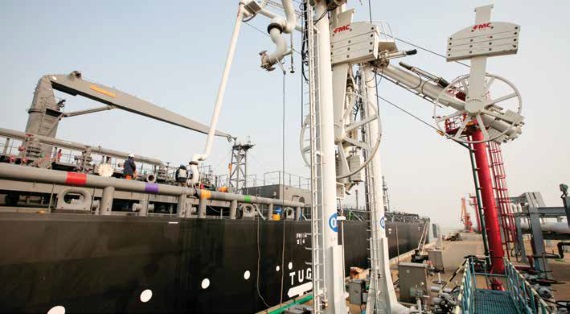 CAO vessel discharging jet fuel at port. (Photo: Company)
CAO vessel discharging jet fuel at port. (Photo: Company)
Apart from developing CAO's businesses, Teo is focused on personal advancement and empowering those who work for her.
"I believe in nurturing my staff, giving them the leeway to experiment and even to fail, as long as the failure isn't too major," said Teo, who tied the knot last year.
One should always be willing to learn, and acquiring knowledge is a life-long experience. "You should always upgrade yourself and pick up new skills," she added.
Besides mentoring students and younger colleagues, Teo is an avid concert-goer and runs at least once a week.
"When I was a trader, money was a key motivator. But I believe I've mellowed over the years. Now, money is not a major driver. Work-life balance is essential, and giving back to the community is also a priority," she added.
Values that resonate with her include being true to yourself and the ability to adapt.
"The toughest thing about being in management is learning how to relate to people. You cannot change people's behaviour, so you need to learn how to influence them," she said with a smile.
The 42-year-old is also a qualified arbitrator and mediator.
"Having been a trader and worked in Western companies for many years, my driven management style can be confrontational at times. But I have realised this may not necessarily be the best approach, and have learnt to compromise."
Financial results
| Year ended 31 Dec (USS$ 000) |
FY2015 | FY2014 | FY2013 | FY2012 |
| Revenue | 8,987,487 | 17,061,031 | 15,571,869 | 14,807,984 |
| Gross profit | 35,444 | 27,397 | 52,491 | 42,750 |
| Net profit | 61,281 | 49,160 | 70,216 | 66,189 |
*restated
| Quarter ended 30 Sep (USS$ 000) | 3QFY2016 | 3QFY2015 | yoy chg |
| Revenue | 3,939,864 | 2,399,425 | 64.2% |
| Gross profit | 10,382 | 12,931 | -19.7% |
| Net profit | 23,219 | 17,727 | 31.0% |
Source: Company data
| Outlook & Risks | ||
|
||
China Aviation Oil (Singapore) Corporation Ltd
CAO is the largest physical jet fuel trader in the Asia Pacific region and the sole supplier of imported jet fuel to the civil aviation industry of China. A subsidiary of China National Aviation Fuel Group Corporation, CAO is listed on the Mainboard of the Singapore Exchange. CAO and its wholly owned subsidiaries - China Aviation Oil (Hong Kong) Co Ltd and North American Fuel Corporation - supply jet fuel to airports outside the PRC, including Asia Pacific, Europe, North America and the Middle East. The Company and its wholly owned trading subsidiary, China Aviation Oil (Europe) Ltd, also engage in international trading of jet fuel and other oil products. The CAO Group owns investments in various strategic oil-related businesses, which include Shanghai Pudong International Airport Aviation Fuel Supply Co Ltd, China National Aviation Fuel TSN-PEK Pipeline Transportation Corp Ltd, Oilhub Korea Yeosu Co Ltd, Xinyuan Petrochemicals Co Ltd and CNAF Hong Kong Refuelling Ltd.
The company website is: www.caosco.com.
Click here for the company's StockFacts page.
For its results for the third quarter ended 30 Sep 2016, click here.


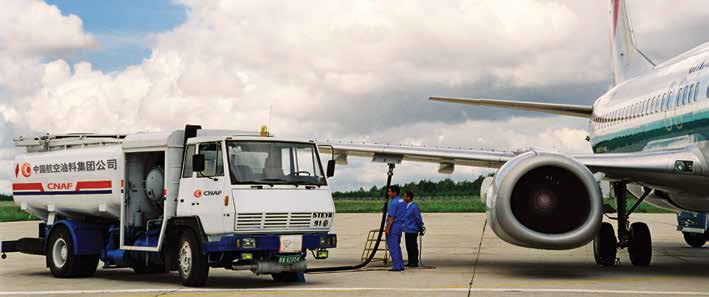

 As senior management, there's a need to stand firm and say 'No', even to the boss. I know this is uncommon in a Chinese-run firm, but it's important to do what is right.
As senior management, there's a need to stand firm and say 'No', even to the boss. I know this is uncommon in a Chinese-run firm, but it's important to do what is right.